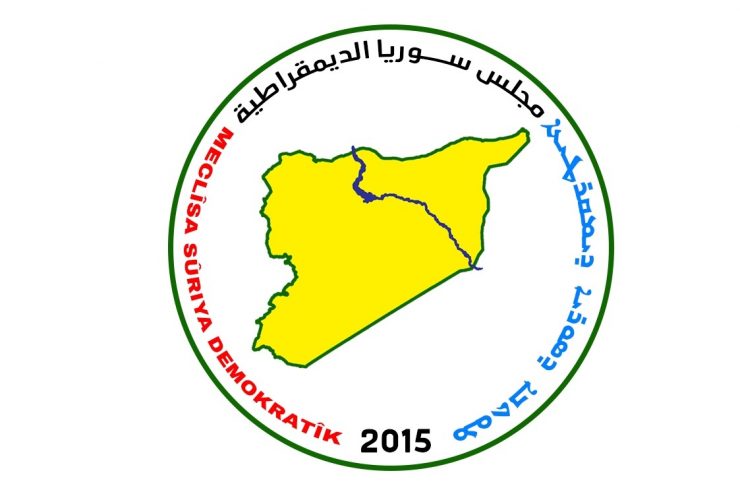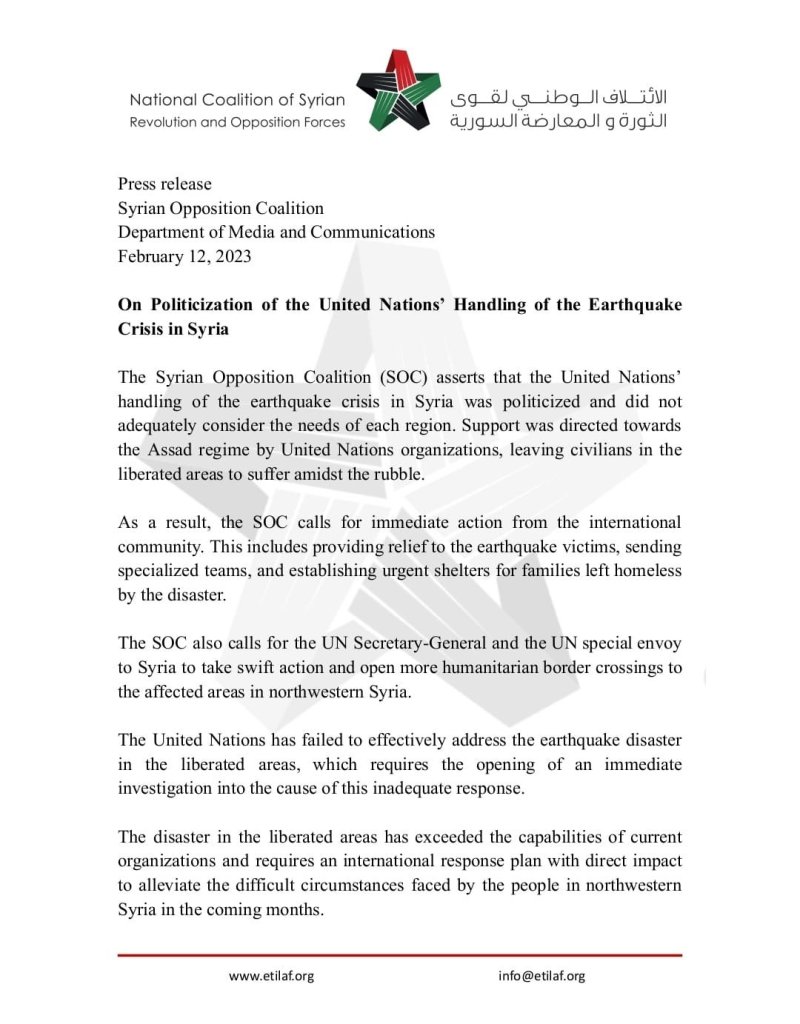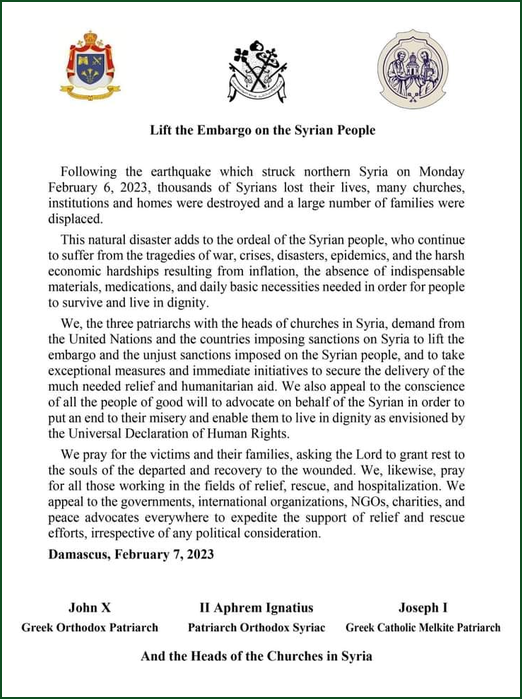

Syria: National Coalition of Syrian Revolution and Opposition Forces – Syrian Opposition Coalition – On Inviting War Criminal Bashar al-Assad to Arab Summit (19.05.2023)





The Syrian Democratic Council follows with great interest international and regional developments and their direct repercussions on the Syrian issue and the deep crisis that the Syrians are experiencing at the humanitarian level as a result of the deterioration of the security situation and the economic situation that cannot be recovered without a correct addressing for its causes, and in a way that establishes the rebuilding of state institutions according to national democratic mechanisms that secures the participation of all Syrians in managing the affairs of their country, especially that any attempt to address a disaster of this magnitude requires the participation of all Syrian citizens in rebuilding and repairing what was damaged by the war over a decade because the corruption has exhausted the structure of the state, and Syria has lost its best cadres, expertise and activities, the war has drained its economy and destroyed ties among Syrians.
The Syrian Democratic Council believes that most of the international efforts made with the aim of resolving the Syrian crisis have been thwarted as a result of the conflict on regional and international interests, and also as a result of not taking into account the supreme and fundamental interests of the Syrian people, which created the appropriate atmosphere for the regime to continue its rejection of ideas that would establish an effective national dialogue that leads to a democratic change, and the Syrian Democratic Council believes that the democratic issue in the country is still the main issue, and without it, Syria will not be able to recover and restructure its national institutions properly.
The Syrian Democratic Council welcomes any international movement, especially the Arab international interest in the Syrian issue, which was recently represented by the Jeddah Meeting that was on April 14th and the Amman Meeting that was on May 1st, the latest of which was the meeting of the Council of the League of Arab States at the ministerial level headed by Egypt in its extraordinary session held on May 7th in the Egyptian capital, Cairo, that these steps take into account the tragedy of the Syrians, which can’t be ended without an integrated political process, so to achieve this, the active national Syrian parties must participate in the political process without any exclusion. The Council hopes that the Arab initiative will contribute in a real way to create conditions for activating the course of the political process in accordance with Security Council Resolution 2254 in order to create the appropriate conditions for the safe return of refugees and not to risk jeopardizing their fate, so the Council confirms that it is ready to cooperate for that, especially on the refugee issue, and the Council supports the initiative of the Autonomous Administration of northeastern Syria announced on April 18th, which explained the possibility of receiving Syrian refugees, as the Council also supports what was mentioned in the previous statements about the need to combat drug trade across borders, and the Council believes that the effects of drug trade are not limited to the region and neighboring countries, but rather it is a deep national problem that has affected large segments of the Syrian youth, as the corruption of state institutions contributed to the spread of its trade in the areas of the Syrian government and the regions which are under the control of the factions affiliated with the Turkish occupation. The regions of northeastern Syria face serious pressure and challenge in combating drugs and attempts to promote them, which is a national priority par excellence that requires a radical reform of national institutions.
The Syrian Democratic Council has been and still is one of the advocates for restoring the Arab role in resolving the Syrian crisis in a way that is consistent and integrated with international efforts, and believing in the natural ties between Syria and the Arab world, as the Council believes that the Arab movement should constitute a real opportunity to exert maximum pressure to achieve a political resolution in a way that achieves the main principles mentioned in UN Resolution 2254, in a manner that meets the aspirations of the Syrians for democratic change.
In this context, the Council also calls on the national democratic opposition to work seriously and responsibly to unify its efforts to hold a national conference for the opposition that represents a new and different beginning based on purely national interest away from the regional interests that have contributed to the complexity of the Syrian crisis and created hatred among them.
Finally, the Syrian Democratic Council shows its full readiness to cooperate and support the political process, provided that it is represented by the active national parties, in a way that achieves the basic goals of the Syrians and ends the various negative effects of the crisis, thus making Syria a safe and stable country and a source of stability and peace throughout the region.
On May 8th, 2023
The Syrian Democratic Council






“Since 1994, sorry to say it in such crude terms, you have never been able to restore the military, security or administrative sovereignty of your country. It is a reality. We must not look for culprits outside, in this case” (…) “Don’t blame the France for something that depends on you” – President Emmanuel Macron (04.03.2023).
Sometimes, hubris and arrogance takes over. In essence, that’s maybe what happened in the Joint Press Conference with French President Emmanuel Macron and the Democratic Republic of Congo’s President Felix Tshisekedi. The French thought he could humiliate and act naive about the past. However, the French has to take responsibility here… their choices and power in the Great Lakes has cost lives and insecurity. Not their actions alone, but they have amplified. That was all done in favour of one ruling elite and regime in the early 1990s in Kigali. This is why there is issues to this day.
In Kinshasa yesterday, Macron could have answered and offered relief for the mistakes of the past. Instead, he pins the blame on the rulers today and brushes of the involvement in the past. That is arrogant and forgetful. Like if “Operation Turquoise” wasn’t implemented and didn’t have any sort of outcome to begin with. While we all know the aftermath and what occurred after the French gave the ex-FAR and “interahamwe” a safe-haven in the DRC. Many of us know the continued bloodshed and insecurity that has persisted ever since. Therefore, the French should take blame, but we see the entitlement of Paris in these regards. Seriously, it is infuriating.
Just read snippets of assessments and writings on the matter!
“That is why, in addition to the major concerns outlined above, we share with you a copy of a memo that we gave to members of the delegation of the Security Council of the United Nations who visited the DR Congo on May 19, 2009 – a memo which tells the tragedy suffered by the Congolese people. This memo can be summarized as follows:
“Since 1994, the superbly armed Hutu, fleeing the advance of the Rwandan Patriotic Army crossed the Congolese border with support of UN operations called ‘turquoise’, headed by France. These Hutus settled in the provinces of North Kivu and South Kivu in flagrant violation of all international standards governing the right of asylum or refuge. Known as the “Interahamwe” or FDLR, Democratic Forces for the Liberation of Rwanda, and so on, these Hutu particularly stand out in DR Congo by practicing acts of looting, rape, massacre and so on. And since they became a pretext for the authorities in Kigali to justify the presence in DR Congo of their regular army, the results are the current massacres and atrocities suffered by our people at Makobola, Kasika Katogota, Lemera, Nindja, Kaniola , Kalambi, Bunyakiri, Kaziba, Luhwindja, Kalonge, Bukavu, Uvira, Kiliba, Katumba Kalehe, Bwegera, Kamituga, Mwenga, Shabunda, Lugushwa, Ngando, Ndola, Kigulube, Bijombo, Masango Tubimbi, Kakungwe, Mushago, Kitutu, Lubuga , Mutambala, Fizi, Minembwe, Bibokoboko, Baraka, Kagabwe, to name a few, as regards the South-Kivu. Moreover, Rwanda’s history is punctuated by cyclical and fratricidal wars driven by a spirit of intolerance and retaliation between Hutus and Tutsis. Hence, when it is the Rwandan Tutsi ethnic group that is in power, their countrymen who are in the majority, the Hutus, are in exile: and vice versa. DR Congo has become each time, the country of pilgrimage for them” (Rev. Aniedi Okure, OP – Letter From Congolese Elected Officials to Secretary of State Hillary Clinton, 26.08.2009).
“That the French government be careful not to use the excuses made to the Rwandan regime to join the club of looters of DRC resources; That the French government take a position on the genocide and serious crimes committed in the Congo by the Rwandans and their accomplices since “Operation Turquoise”; That the French government in turn come out clearly in favor of the creation of an International Criminal Tribunal for the DR Congo, responsible for prosecuting the perpetrators of the genocide and serious crimes committed in the Congo since “Operation Turquoise” in 1994; That the parliamentarians friends of the Congo, introduce these concerns of the Congolese people in their questions to the government and before the European institutions” (Hamuli RETY – ‘CRID MEMORANDUM ON THE CONSEQUENCES OF “OPERATION TURQUOISE” AND THE CONGOLESE GENOCIDE IN THE DRC’ 08.03.2010, CRID).
“The escape of many of these Hutu extremists was enabled by the French safe zone, concealed by the flood of refugees. To fight these rebels, the new Rwandan government supported the Alliance of Democratic Forces for the Liberation of Congo (AFDL), which also aimed at overthrowing the president. This caused a violent emergency in the DR Congo in October 1996. Therefore, the intervention did trigger instability in a neighboring country, however, the conflict did not occur within two years after the end of the intervention” (Rwanda 1994, Teresa Leiendecker, Karolina Schmid, 21.12.2018).
When you read these things and from very different sources. You understand the deep underlying sentiment. Alas, the French has responsibility for the insecurity in the DRC. It is partly their fault and it cannot hide from it decades later. The choices made by the leaders of Paris has haunted the DRC. It still does and the remains of these decisions are costing lives today. Therefore, Macron should be more humble and understanding.
However, he met an inept and unprepared President. The leaders of Kinshasa wasn’t prepared or ready for yesterday. They didn’t think it would play out like it this week, but it has. Macron trying to act like the “hot shot” and “big man” but not account for the past transgression of his nation. That’s something he should acknowledge, but if he does… he knows he will have to pay consequences right now, but also possibly at home. That’s why he doesn’t have the courage or the heart to do so. Peace.

Since the first moment of the earthquake disaster on the sixth of February, the Syrian Democratic Council has devoted all its political and diplomatic potential at the service of the Syrian people who were affected by this disaster. Also, the Council has devoted its various relations for exerting the necessary pressure to open humanitarian crossings and introduce the necessary aid and relief materials. The Syrian Democratic Council has also encouraged local initiatives inside Syria, whether civil, popular or official initiatives, the most prominent of which was the initiative of the Autonomous Administration of northeastern Syria.
Fourteen days after the disaster, the Council considers that the policies that were implemented during the disaster hindered the chances of saving many lives lost under the rubble and deprived the affected people of access to the assistance they deserve.
The armed factions of the Turkish occupation prevented the assistance that arrived early to the crossings of the Autonomous Administration, and these factions and the coalition continued to support the Turkish policy towards the Syrian victims, despite the fact that the disaster proved that the Turkish state institutions were unable to perform their duties towards their citizens inside Turkey, which negates the need to prove that Turkey did not provide any support to Syrians in its occupation zones, and for considerations of Turkish internal policy, the media of Justice and Development Party intended to emphasize that priority is for Turkish victims, in which racial discrimination has been practiced in saving lives and access the support and aid to those in need, but the crime condemned against the Syrian victims in northwestern Syria is represented by the Turkish orders, according to which the factions affiliated with Turkey refused to receive the assistance of the Autonomous Administration, ignoring what the Civil Defense bodies announced about their urgent need for such assistance, and according to the moral and national humanitarian duty, we sought; as the Syrian Democratic Council, to provide all facilities despite our conviction that these mercenary terrorist factions are not trusted regard such assistance.
The Syrian Democratic Council also condemns in the strongest terms the demographic change policies practiced by Turkey against the Kurds in northwestern Syria and calls on the international community to intervene and exert pressure to stop the displacement of Kurds from their places of origin, where more than 70% of the people of Afrin have been displaced so far, and the Council warns of the investment of the Turkish occupation authorities of international assistance provided to Syrians, especially donations allocated by some countries, to build new buildings and villages in lands owned by Kurdish citizens, and also the Council condemns the continuation of Turkish aggressions on northeastern Syria, where Turkish forces targeted Al-Mahmudiyah village and also the Turkish drones targeted several civil cars over the past two weeks.
On the other hand, the ruling authority in Damascus, despite its emphasis on the importance of national dialogue, decided to exploit the disaster for its political interests and rejected internal national initiatives for helping the victims in line with its preconceived position rejecting any openness to democratic political powers calling for a peaceful democratic transition, and the Council holds the policies of the authority in Damascus primarily responsible for the deterioration of the humanitarian and economic situation of citizens in general and those affected by the earthquake in particular, as the Syrian Democratic Council has previously stressed the importance of Syrians to overcome their differences, establish a broad democratic front for dialogue and negotiation with the authority in Damascus, and contribute to the political process and represent various Syrian powers and actors in the negotiation process aimed at implementing Security Council Resolution 2254. In accordance with the above mentioned, the Council reaffirms that the Syrian national dialogue is a strategic and indispensable option for it, provided that it includes effective political representatives from all components and segments of society, on the basis of achieving a meaningful and comprehensive political transition in the country. It also stresses that any such national dialogue process must be launched with international guarantees including international allies of the authority in Damascus provided that without bias for any party.
The Syrian Democratic Council, while comforting the families of the victims and wishing speedy recovery for wounded, stresses that the Syrian people must hold those are involved in stealing their daily sustenance accountable. The Council also calls on the various national democratic powers to join hands and find effective mechanisms to monitor the activity of various authorities on the ground and follow up the delivery of humanitarian aid sent to affected people. As the Council also calls on the democratic powers in Syria to escalate their struggle in order to frame their efforts and not miss more opportunities that would alleviate the suffering of Syrians.
On February 22nd, 2023
The Syrian Democratic Council



